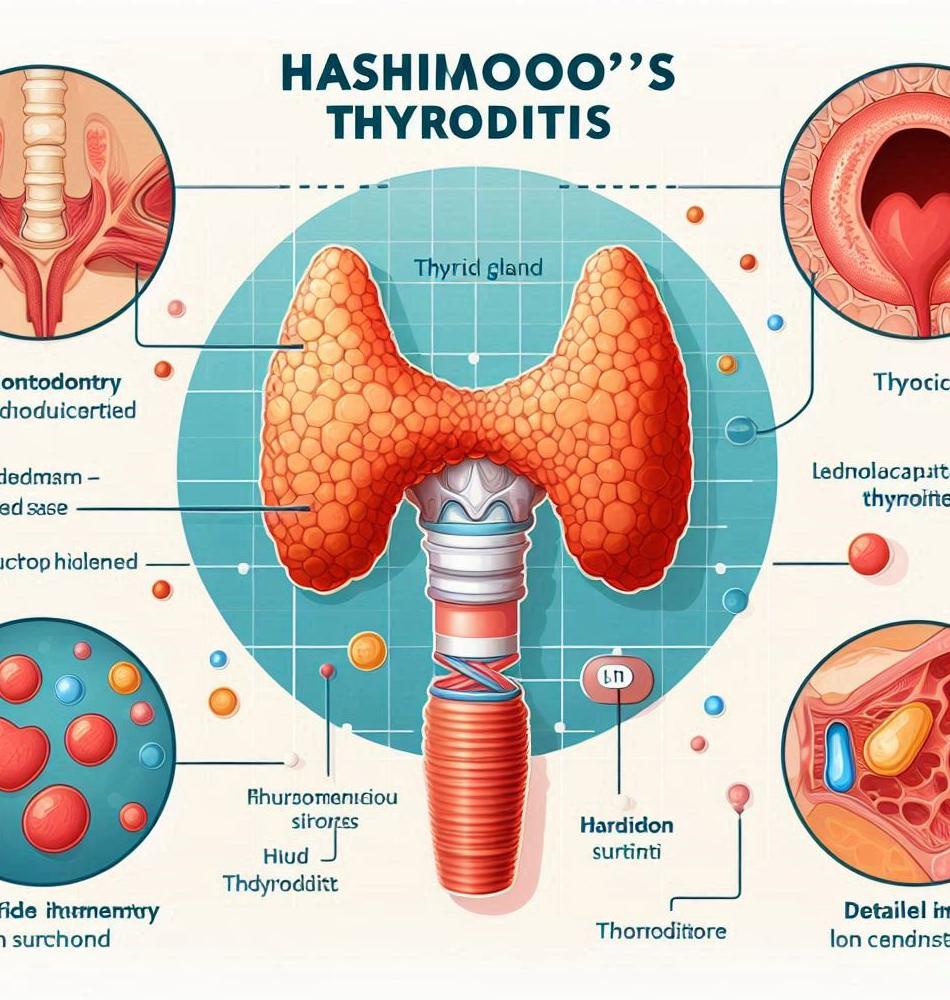Discover the essential steps and tests for diagnosing Hashimoto's Disease, an autoimmune disorder affecting your thyroid function. Learn about symptoms, testing methods, and FAQs.
Introduction 🌟
Hashimoto's Disease is a stealthy adversary that can disrupt the delicate balance of your body's hormonal harmony. Since its symptoms often mimic other ailments, getting a definitive diagnosis can feel like searching for a needle in a haystack. But fret not! This comprehensive guide is here to illuminate the path to understanding how to test for Hashimoto's Disease, arming you with the knowledge necessary to advocate for your health.So what exactly is Hashimoto's Disease? In simple terms, it is an autoimmune disorder where your immune system mistakenly attacks your thyroid glands, leading to an underactive thyroid, or hypothyroidism. Given the prominent role of the thyroid in the body, any disruptions can trigger a cascade of health issues. Let’s dive deeper and explore how to test for this disease effectively.
Understanding Hashimoto's Disease ⚡
What Causes Hashimoto's Disease? 🔍
Before discussing testing methods, we must grasp what leads to the onset of Hashimoto's Disease. The exact cause remains unclear, but several factors contribute to the likelihood of developing this condition, including:- Genetic predisposition- Hormonal changes (especially in women)- Environmental triggers- Psychological stressors- Certain medications and infections
Recognizing the Symptoms 🛑
Pinpointing Hashimoto's can be perplexing due to its wide range of symptoms. Here is a sampler of those you might experience:- Fatigue and lethargy- Weight gain or difficulty losing weight- Cold intolerance- Hair thinning or brittleness- Muscle weakness- Mood swings or depression
Why is Testing Important? 🔑
Identifying whether you have Hashimoto's is not just about ticking off boxes on a symptom list. An early diagnosis can lead to timely intervention, which often involves hormone replacement therapy. Thus, understanding how to test for Hashimoto's can be paramount in reclaiming your well-being.
How to Test for Hashimoto's Disease 🧪
Determining whether you have Hashimoto's Disease generally involves a combination of the following tests conducted by your healthcare provider.
Thyroid Function Tests ☑️
The primary tests for diagnosing Hashimoto's Disease focus on assessing your thyroid hormone levels. These tests often include:1. **TSH (Thyroid-Stimulating Hormone) Test**: Indicates how effectively your pituitary gland signals the thyroid to produce hormones. Elevated TSH levels can suggest hypothyroidism.2. **Free T4 Test**: Measures the amount of the active thyroid hormone in your bloodstream. Low levels can indicate an underactive thyroid.3. **Free T3 Test**: Although not as commonly used, this test measures another vital thyroid hormone that can affect metabolism.
Antibody Tests 🦠
If initial thyroid function tests suggest hypothyroidism, the next step often involves testing for specific antibodies associated with Hashimoto's Disease:- **Anti-TPO Antibodies**: The most commonly tested antibody that signifies an autoimmune attack on the thyroid.- **Anti-Thyroglobulin Antibodies**: Although less common, assessing these levels can provide additional insights.
Additional Testing Options 💉
While the above tests typically suffice, some doctors may recommend further diagnostics to gauge thyroid health or rule out other conditions:- **Uptake Scans**: Evaluate how well your thyroid absorbs iodine.- **Ultrasound**: Can help detect abnormalities in the thyroid structure.
When to Seek Testing 🔎
If you suspect you may have Hashimoto's Disease, consider seeking medical advice under the following circumstances:- You have multiple symptoms associated with hypothyroidism- A family history of thyroid disorders exists- You experience significant fatigue that seems unusual- Changes in weight or mood are difficult to explain
Frequently Asked Questions about Testing for Hashimoto's Disease ❓
- What should I do if my TSH levels are elevated?- How can antibodies affect my treatment options?- Are there lifestyle changes I should consider while testing?- How often should I get tested if diagnosed?- Can Hashimoto's Disease be confused with other thyroid disorders?Each question brings with it the potential for nuanced responses, emphasizing the importance of consulting with your healthcare provider to tailor your path forward.
Moving Towards Diagnosis and Treatment 🏥
After undergoing the necessary tests, the results will guide healthcare professionals in crafting a personalized treatment plan. Here are the typical next steps you might encounter:- **Medication**: Synthetic thyroid hormones such as levothyroxine may be prescribed to help balance your hormone levels.- **Regular Monitoring**: Continued testing will be necessary to assess how well you are responding to treatment.- **Lifestyle Adjustments**: Emphasizing a balanced diet, exercise, and stress management can significantly influence your overall health.
Image of Regular Medication for Hashimoto's Disease 💊
Conclusion 🌈
Understanding how to test for Hashimoto's Disease is not merely academic; it is a crucial aspect of safeguarding your well-being. With the proper testing protocols, you can navigate the complexities of this autoimmune disorder and emerge stronger on the other side. Remember, your journey towards diagnosis and treatment begins with proactive measures and informed discussions with healthcare professionals.Taking control of your health is empowering. As you venture forth, keep in mind the clear path ahead of you built upon knowledge, awareness, and vigilance.
.png)






